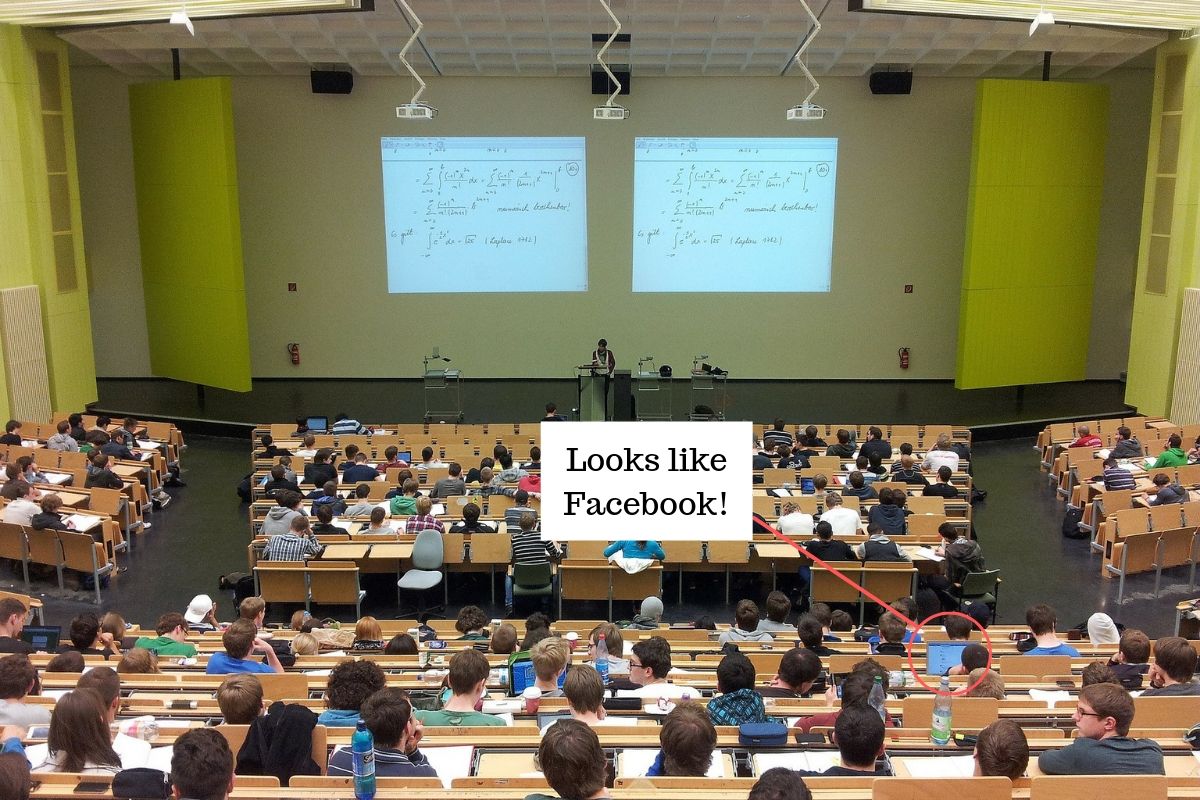
This is one of a number of articles that I have written in relation to exams. You can get the growing list here. In this blog post I look at an interesting article on the potential impact of using mobile devices during lectures.
Whenever I give a presentation, it is commonplace to look around and see many members of the audience on their mobile phone or laptops.
Some of them are using these devices to take notes, but many are using the devices to access non-presentation related content.
At first I was a little taken-aback at the sight of so many audience members dividing their attention between me and whatever they were looking at on their phones, but then I realised that I often do the same. We all love to ‘multi-task’, convinced we are somehow cheating the system and learning twice as much in the same period of time.
In reality, we are all probably kidding ourselves. I’ve not read anything convincing that suggests true multi-tasking is possible. Doing two things at once doesn’t translate into getting twice as much done. In fact the losses accrued through trying to switch between two or more tasks might be more than if we simply did each task consecutively.
Potential losses aside, I still must admit that I regularly engage in multi-tasking. I’m going to guess that you do too.
But a research paper I read today suggests there is at least one type of multi-tasking that you, as a student, might want to avoid, if you value exam performance.
The research paper, written by Arnold L. Glass and Mengxue Kang is called ‘Dividing attention in the classroom reduces exam performance‘ and appeared in a recent issue of Educational Psychology.
The authors wanted to know if students who attended lectures experienced any kind of impaired retention of information, as a result of simultaneously using their mobile devices (phones and laptops) to access non-lecture related information. Previous studies had suggested an association between electronic device use during lectures and poorer exam performance.
So they created a real-world trial.
As part of a 25-lecture cognitive psychology course, the authors manipulated it so that for 1/2 of the lectures, 118 students were allowed to use their mobile devices and the other 1/2 they were not.
Students were tested for retention of the material presented in these lectures at three time points:
- during the lecture itself – that is – they were taught something then immediately tested (in a multiple choice format) on their comprehension of the material
- during 3 unit exams placed at different points during the course
- during a final exam at the end of the course
What they found was that the use of mobile devices for non-lecture related content did not impair retention of information during the lecture, but did impair retention of that same information for the unit exams and the final exams. Basically, the negative impacts of using mobile devices during lectures was not apparent until the exams.
An additional freaky finding was that students who were not using mobile devices, whilst others in the lecture did, experienced some of the same negative impacts on exam performance. This means it is possible to be distracted by others using their devices during a lecture in the same way as you might be distracted using your own device.
The size of the negative impact? About a 5% reduction in exam performance, which the authors suggested was a significant underestimate of the real-world impact as the study design was likely supporting retention at the same time as testing.
Why does using your device during lectures impair later exam performance?
What is really interesting about these findings is that comprehension and retention of material during the lectures was not impaired. Students who were on their phones or devices weren’t any worse at answering the questions during the lecture. It wasn’t until later, during the exams, when it was discovered that they hadn’t retained as much of the material long-term.
In explaining this, the authors hypothesised that there are two memory systems in operation during a lecture. One memory system is focused on capturing the information and keeping it in short-term memory – a form of recognition memory. The second system is involved in internally rehearsing that knowledge to help it get put into long-term memory. Using your device during a lecture seems to impair the second type of memory system, hence the impacts aren’t experienced until later.
Implications
Don’t use devices during lectures and tutorials unless they are to keep notes. Whilst it may feel like it is not impairing you comprehension, it may well be impairing your retention of that information for the future.
Be mindful that your device usage during a lecture might be impairing the learning of those around you who are not using their devices.
If you do commonly use a device during lectures, be mindful that you may not have as good a memory for the lecture content as you think you might. This puts additional pressure on your revision process. Be sure to go through all content comprehensively as part of your exam revision.
The social environment of lectures plays an important role in learning. Maybe we need to reconsider whether we think it is OK for people to be using their mobile devices during lectures.

